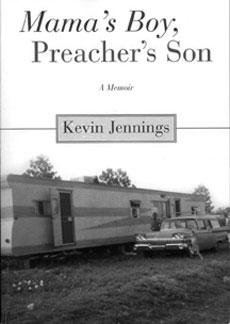A unique perspective on a tumultuous gay experience is reflected through the setting of the conservative South in Kevin Jennings’ memoir, Mama’s Boy, Preacher’s Son. Through a strong, articulate voice, the author depicts his journey growing up in mobile homes, poor, and feeling the ever-lingering pressures of a world suffocating him from all directions.
In Jennings’ eloquent narration of his childhood, he exemplifies a way in which the already difficult hetero-normative experience of wanting to “fit in” and “make friends” is compounded by being gay. Through his college years at Harvard, being the first of his entire extended family to venture on to post-secondary education, Jennings details the elation of being able to come out. In his professional life, Jennings is setback and battles the challenges of being able to be an openly gay high school teacher.
The most provocative aspect of Jennings’ perspective is his growing up poor and in the South. With the Southern Baptist church serving as the “central institution of [their] lives,” the Jennings’ world left little room for anything other than the homo-normative, white, conservative construct, and plenty room for homophobia. Though his parents represented an unconventional marriage-she an Appalachian-born Southerner, he a Massachusetts “Yankee” native-they raised children in a place and time where there were “no gays” and segregation was in full-force.
The Black struggle and the Queer experience merge forcefully in Jennings’ story. Like so many children born out of the late ’60’s, whites and blacks kept to themselves. To Jennings’ parents’ great shock, one of his brothers ends up marrying a black girl. This turns the family’s perspective on its head.
Jennings himself had always equated having a black sister-in-law with great shame until he met her in person. Jennings’ acceptance of his black relative, despite deeply rooted ideas associated with social constraints, is a reflection of his own experience of others accepting him. In the sharing of this portion of his personal story with us, Jennings grows out of the boundaries of his nurtured environment; extends beyond the naiviete of the world, as he knew it.
As a high school teacher, Jennings decides to come-out. Not only to come-out to his professional co-workers but to his students. He does this in an impressively brave and unexpected manner-one that defines the attitudes of the book. Just as Jennings leaves no stone unturned in the very honest depiction of his complicated life, word meets action in his equally honest and upfront approach to coming out.
Jennings went on to become founder of GLSEN, the Gay, Lesbian, and Straight Education Network. Spending the last twelve years building GLSEN into a national organization, Jennings is a leader in the bold movement that now works with over 3,000 Gay-Straight Alliances in schools across the country. The organizations aim to promote a safe, nurturing educational environment for students who are gay, lesbian, and transgendered. In our very short history of first-hand accounts of the Queer experience, Jennings book is a must-read for anyone interested.





















































